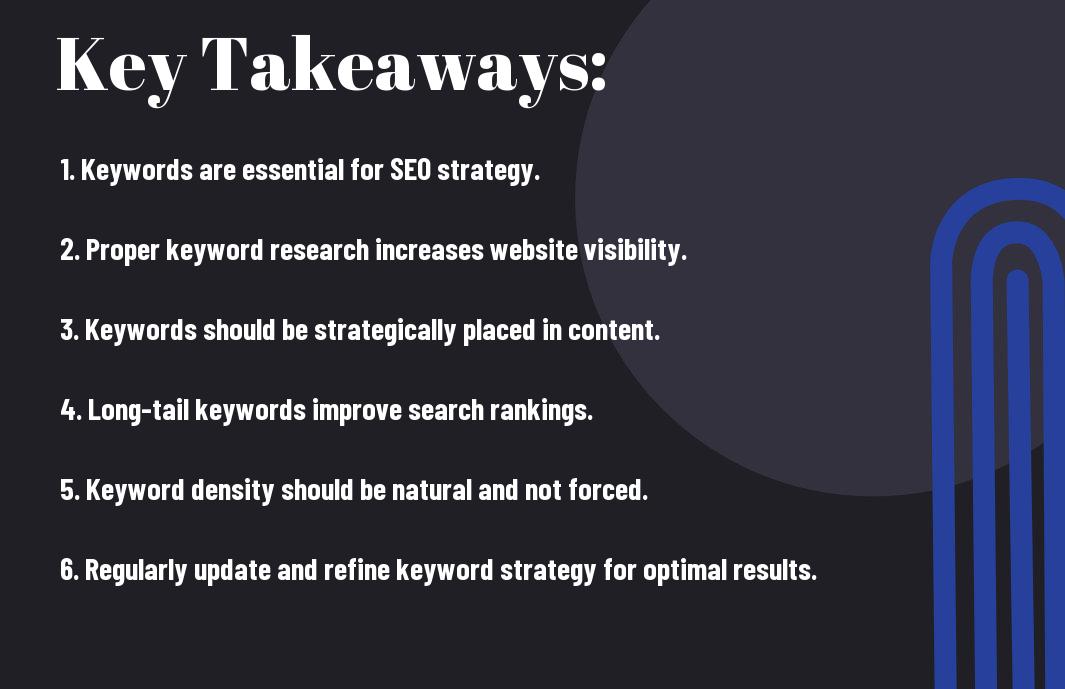Pulchritudinous. Yes, that’s a rare word, and just like rare words, finding the right keywords is essential for the success of your website’s SEO strategy. When it comes to search engine optimization, keywords play a pivotal role in determining your website’s rank in search engine results. By effectively incorporating relevant keywords into your content, you can increase your website’s visibility and drive organic traffic. However, it’s important to understand the importance of using the right keywords and the potential pitfalls of keyword stuffing or using irrelevant terms. In this blog post, we’ll explore the role of keywords in SEO and provide you with valuable insights on how to effectively utilize keywords to enhance your website’s search engine performance. So, let’s dive into the world of keywords and take your SEO strategy to the next level.
Key Takeaways:
- Keywords play a crucial role in SEO as they help search engines understand and rank content based on relevance to user search queries.
- It is essential to conduct thorough keyword research to identify the most relevant and high-performing keywords in the target market or industry.
- Proper keyword optimization in various elements of a website, such as title tags, meta descriptions, and content, can significantly impact search engine rankings and visibility.
- Utilizing long-tail keywords can help target specific niche audiences and improve the chances of ranking for more specific search queries.
- As search engine algorithms continue to evolve, it is crucial to continuously monitor and update keyword strategies to maintain and improve search engine rankings.

Understanding Keywords
Assuming you are new to the world of SEO, understanding keywords is the first step to optimizing your website for search engines. Keywords are the words and phrases that people use to search for information online. To gain a better understanding of keywords, you can read the blog post All About Keywords: What They Are, Why They Matter and How to Use Them.
Types of Keywords: From Short-tail to Long-tail
When it comes to keywords, they can be categorized into two main types: short-tail and long-tail. Short-tail keywords are shorter, more generic terms that are highly competitive, making it challenging to rank for them. On the other hand, long-tail keywords are longer and more specific, often providing higher conversion rates due to the searcher’s clearer intent. After understanding the difference between these two types, you can utilize them effectively in your SEO strategy.
| Keyword Type | Description |
|---|---|
| Short-tail | Short, generic, highly competitive |
| Long-tail | Long, specific, higher conversion rates |
Keyword Relevance and Searcher Intent
When choosing keywords for your website, it’s crucial to consider their relevance to your content and the intent of the searcher. Are the keywords you’re targeting aligned with what your audience is looking for? Ensuring that the keywords you use match the intent of the searcher will increase the chances of your website appearing in relevant search results. By understanding and addressing searcher intent, you can optimize your content to better meet the needs of your audience.
Keyword Research Strategies
Despite changes in search engine algorithms, keywords are still crucial for SEO. You need to use the right keywords to reach the right audience. Here are some effective strategies to conduct keyword research.
Tools for Keyword Discovery and Analysis
When conducting keyword research, it is essential to use the right tools to discover and analyze keywords. You can use tools such as Google Keyword Planner, SEMrush, Ahrefs, and Moz Keyword Explorer to find relevant keywords for your content. These tools can help you identify high volume keywords, long-tail keywords, and related keywords that can improve your content’s visibility and ranking on search engines.
Assessing Competition and Keyword Difficulty
After discovering potential keywords, you need to assess the competition and keyword difficulty. This involves evaluating the strength of your competition for specific keywords and determining how difficult it will be to rank for those keywords. You can use tools like SEMrush and Moz to analyze the competition and difficulty of keywords. Additionally, you can look at factors such as search volume, current rankings, and domain authority to determine the competitiveness of certain keywords. It’s important to focus on long-tail keywords that are less competitive and have a higher chance of ranking for.

Optimizing Content with Keywords
Not only do keywords play a crucial role in establishing the relevance and visibility of your content, but they also help search engines understand the topic of your material. By optimizing your content with relevant keywords, you can improve your chances of ranking higher in search engine results pages (SERPs).
Strategic Placement of Keywords in Content
When it comes to optimizing your content with keywords, it’s essential to strategically place them in prominent areas. You should include keywords in your page title, meta description, headers, and the body of your content. By doing so, you can signal to search engines the relevance of your material and improve its chances of appearing at the top of search results.
Balancing Keyword Density and Readability
While it’s important to incorporate keywords into your content, it’s equally crucial to maintain a balance between keyword density and readability. Your primary focus should be on providing valuable and engaging content for your audience. Overloading your content with keywords can negatively impact the readability and overall user experience. Therefore, you should prioritize creating high-quality content that naturally incorporates relevant keywords.
Tracking and Improving Keyword Performance
Your understanding of keywords in SEO is fundamental to the success of your website’s search engine optimization. Once you have done the hard work of researching and implementing keywords, it is essential to track their performance and continuously improve them. This will ensure that your website ranks higher in search engine results, driving more organic traffic to your site. If you want to learn more about the role of keywords in SEO, I recommend reading this insightful article on What Is The Role Of Keywords In SEO?
Metrics for Measuring Keyword Success
Measuring the success of your keywords is crucial in determining whether your SEO strategy is effective. The most important metrics to track include keyword rankings, organic traffic, click-through rates, and conversion rates. By analyzing these metrics, you can identify which keywords are performing well and which ones need improvement. Additionally, you can use tools like Google Analytics and SEMrush to gain insights into keyword performance and make data-driven decisions to optimize your SEO strategy.
The Role of Continuous Optimization
Continuous optimization of your keywords is necessary to stay ahead in the competitive world of SEO. This involves regularly monitoring keyword performance, identifying new opportunities, and making adjustments to your keyword strategy. By continuously optimizing your keywords, you can adapt to changes in search engine algorithms, stay relevant to your target audience, and improve your website’s overall visibility. It’s important to stay updated with the latest SEO trends and best practices to ensure your keywords are always optimized for maximum impact.
The Role of Keywords in SEO
From above, you can see how crucial keywords are in optimizing your website for search engines. By strategically incorporating relevant keywords into your website content, you can improve your chances of ranking higher in search engine results pages. This, in turn, can lead to increased visibility, traffic, and ultimately, conversions for your website. Remember to conduct thorough research to identify the best keywords for your business and continue to monitor and update them as needed. By understanding and applying the role of keywords in SEO, you can effectively enhance your online presence and drive success for your business.
The Role of Keywords in SEO
Q: What are keywords in SEO?
A: Keywords in SEO are words or phrases that users enter into search engines when looking for information. These words are crucial for helping search engines understand the content of a website and determine its relevance to a user’s search query.
Q: Why are keywords important in SEO?
A: Keywords are important in SEO because they form the foundation of how search engines rank and identify the content of web pages. By optimizing a website’s content with relevant keywords, it becomes more likely to be shown in search engine results pages (SERPs) when users search for related topics.
Q: How do I choose the right keywords for my website?
A: To choose the right keywords for your website, conduct thorough keyword research to identify search terms that are relevant to your business or industry and have a high search volume. Consider using tools such as Google Keyword Planner or SEMrush to find potential keywords and analyze their competitiveness and search volume.
Q: How should keywords be used in website content?
A: Keywords should be strategically incorporated into website content, including titles, headings, meta descriptions, and body copy. However, it’s important to use keywords naturally and avoid keyword stuffing, which can result in a negative user experience and harm your website’s SEO performance.
Q: Are long-tail keywords important for SEO?
A: Yes, long-tail keywords are important for SEO as they often have lower competition and higher conversion rates. By targeting specific, longer phrases that are closely related to your products or services, you can attract highly qualified traffic to your website and increase the likelihood of conversion.
